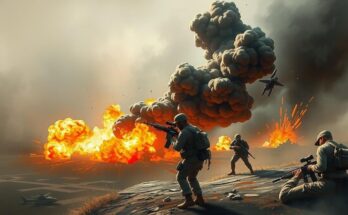The crisis in the Democratic Republic of Congo escalates as M23 rebels seize territory, prompting military involvement from Rwanda, Burundi, and Uganda. President Tshisekedi aims to reclaim lost ground while accusing Rwanda of backing the rebels. Regional dynamics are complex, with potential for wider conflict if diplomatic efforts do not succeed.
The ongoing crisis in the Democratic Republic of Congo (DR Congo) has been exacerbated by the M23 rebels seizing territory in the resource-rich eastern region, prompting a humanitarian and diplomatic outcry involving neighboring countries. The situation has seen various African nations deploy troops amid a history of external intervention. In response, regional blocs are convening an emergency summit to address the escalating conflict.
President Félix Tshisekedi of the DR Congo is at the forefront, seeking to reclaim territory lost to M23 rebels, particularly the vital city of Goma. He accuses Rwandan President Paul Kagame of backing the rebels with armaments, aiming to appropriate the country’s mineral resources and instigate regime change. Although international consensus acknowledges Rwanda’s involvement, support for tangible action against it has been lacking, leaving Tshisekedi concerned about both territorial integrity and his political survival.
Rwanda’s President, Paul Kagame, remains a pivotal figure, skilled at redirecting scrutiny. While Rwanda denies direct military support to M23, Kagame argues that military intervention is necessary for national defense against threats from armed groups originating from the 1994 Rwanda genocide. Rwanda’s focus is on maintaining influence in eastern DR Congo, seeking acknowledgment from Kinshasa to engage directly with M23, albeit under its strategic conditions.
Burundi plays a vigilant role, considering Rwanda a potential security threat. With its army stationed in eastern DR Congo, Burundi has engaged with Congolese forces against M23 but is wary of escalating Rwandan influence. President Evariste Ndayishimiye’s social media warnings reflect concerns that Rwandan ambitions could destabilize his government, particularly if M23 advances towards South Kivu.
Uganda’s involvement is multifaceted; it has troops in the region combating militants linked to ISIS, yet is politically ambiguous due to alleged support for M23. While the Ugandan government refutes these claims, local reports of troop movements raise tensions. Analysts suggest that Uganda aims to preserve its influence amidst Rwandan ambitions in the mineral-rich area.
In contrast, South Africa, contributing the most troops to a regional force, has faced casualties and tensions with Rwanda. Strained diplomatic exchanges have ensued, particularly following claims that Rwandan forces contributed to South African troop deaths. The discord highlights rifts between regional blocs regarding approaches to DR Congo, with East African nations supporting dialogues with M23 while Southern African states prioritize Congolese sovereignty.
As the complexity of the DR Congo crisis unfolds, ongoing regional tensions and involvement from neighboring nations indicate significant implications for security and governance in the area. The potential for conflict expansion poses a danger reminiscent of past regional wars, necessitating concerted diplomatic efforts to restore stability in the region.
The Democratic Republic of Congo has long been a focal point of conflict due to its vast mineral wealth and turbulent history. The M23 rebel group, emerging from past conflicts, has exploited power vacuums and regional instability, while neighboring countries such as Rwanda, Uganda, and Burundi have historically influenced the conflict dynamics through military interventions and support for various factions. As tensions escalate, a regional diplomatic response is crucial to addressing the ongoing humanitarian crisis and preventing broader regional instability.
The DR Congo crisis underscores a complex interplay of military actions, geopolitical interests, and regional rivalries. President Tshisekedi’s government faces substantial challenges from M23’s advances, backed allegedly by Rwanda, while regional players like Burundi and Uganda seek to safeguard their interests amidst a volatile situation. The potential for escalated conflict requires immediate and coordinated diplomatic action to restore stability and protect civilian lives.
Original Source: www.bbc.com




